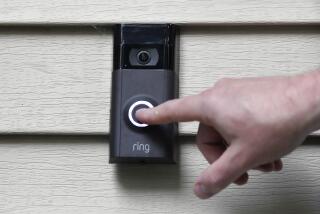GAO Calls Rules on ‘Slamming’ Inadequate
- Share via
WASHINGTON — Telephone customers are not being adequately protected by the government from the illegal practice of “slamming”--the unauthorized switching of a person’s long-distance company--a report to Congress concludes.
The General Accounting Office, which is the investigative branch of Congress, found that neither federal anti-slamming regulations administered by the Federal Communications Commission nor state rules are effective.
Sen. Susan Collins (R-Maine) ordered the report, which was a focal point of a hearing Thursday in the Senate permanent subcommittee on investigations, which Collins chairs.
“To me, deliberate slamming is like stealing, and it should not be tolerated,” Collins said.
“We think we can be faster. We think we can hit them [slammers] harder, and we’re going to do that,” said the FCC’s John Nakahata, chief of staff to commission Chairman William Kennard. The FCC is expected to adopt tougher anti-slamming rules in a few weeks.
The report also said the FCC wasn’t doing enough to try to prevent unscrupulous individuals from getting into the long-distance business.
“For example, the FCC does not review information submitted to it in tariff filings that may alert it to unethical applicants,” it said.
Tariffs are lists of prices and services companies provide the agency.
The GAO said it filed a tariff to provide long-distance service through a made-up company called PSI Communications. “In short, although we submitted fictitious information for the tariff and did not pay FCC’s required $600 application fee, we received FCC’s stamp of approval.”
In 1997, the FCC received more than 20,000 slamming complaints--its single largest number of telephone-related complaints.
The GAO report also said the FCC takes “an inordinate amount of time” to identify companies that are slamming and take correction action.
As a case in point, the GAO cited Fletcher Cos., a group of long-distance companies that the FCC fined more than $5 million on Tuesday. Fletcher had been slamming people on a widespread basis in 1995, but the FCC didn’t begin to take action until June 1997, the GAO said.
Nakahata conceded the FCC could act more swiftly and that it will.
Collins’ bill would, among other things:
* Increase fines against companies that slam.
* Require local phone companies to report a summary of slamming complaints to the FCC for investigation.
* Require the FCC to report to Congress on whether its current procedures contain sufficient safeguards to prevent unscrupulous phone companies from receiving operating authority from the FCC.
More to Read
Sign up for Essential California
The most important California stories and recommendations in your inbox every morning.
You may occasionally receive promotional content from the Los Angeles Times.








